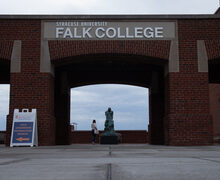New York residents usually vote against holding a constitutional convention. This year could be different, one expert says.
Lucy Naland | Presentation Director
While New York state voters have traditionally voted to not hold state constitutional conventions, one expert said she thinks this year could be different.
Kristi Andersen, a professor emerita of political science at Syracuse University’s Maxwell School of Citizenship and Public Affairs, said President Donald Trump’s administration has helped spur a growing desire among people to protect the environment and women’s reproductive choices.
New York residents, on Nov. 7, will vote on whether they want officials to hold a constitutional convention. Residents vote on constitutional convention proposals every 20 years. The last convention requested by voters was held in 1938.
During a constitutional convention, delegates — elected representatives of Senate districts throughout New York — vote to amend the state constitution.
“They could simply add amendments or they could scrap the whole thing and start over,” Andersen said.
While amendments can be made to the state’s constitution, the amendments must pass through the Legislature multiple times before they can be ratified, Andersen added.
Some state residents feel that changes are not happening fast enough in the Legislature, Andersen said.
Those in favor of and those against hosting the convention are not divided along party lines, and two of the main issues influencing whether a convention is held are reproductive rights and labor unions, Andersen said.
“It depends on your personality. If you’re generally fearful, you could think that things you like will be taken away,” Andersen said.
Carl Heastie, the Democratic Speaker of the New York State Assembly, has said he opposes the constitutional convention.
“A Constitutional Convention could undoubtedly do irreparable damage to many of the hard-fought gains that New Yorkers have championed for generations, including labor protections, women’s rights, environmental protections and even education funding,” Heastie said in an email.
The state’s Senate majority leader, Republican John Flanagan, has also said he is against the convention, according to The New York Times. Flanagan could not be reached for comment on this article.
If the electorate votes “yes” in November, delegates would be elected next year, during the 2018 midterm elections.
District gerrymandering has emerged as a hot-button issue as politicians deliberate the benefits and negatives of holding a constitutional convention.
Stephen Gottlieb, a professor emeritus at Albany Law School, said Gill v. Whitford — a case under consideration by the United States Supreme Court — could set a national precedent for gerrymandering. That case’s outcome won’t be made public until the end of the judicial term in June, though.
Malapportionment, or the misappropriation of representative seats according to population of a given district, is another issue that could affect the convention, Gottlieb said.
Partisan gerrymandering and malapportionment are both issues that could be addressed at the convention, also, but only after another year-long campaign in which anyone can run through a major party, Gottlieb said.
“They make their own rules,” Gottlieb said. “They basically decide how they want to organize themselves and what they want to produce.”
After delegates are selected, they will convene and deliberate as they see fit until they have finished the convention.
“This is a very unusual situation. I don’t know any other states that require voters to consider the possibility,” Andersen said.
Published on October 31, 2017 at 10:09 pm
Contact Charlie: [email protected]




